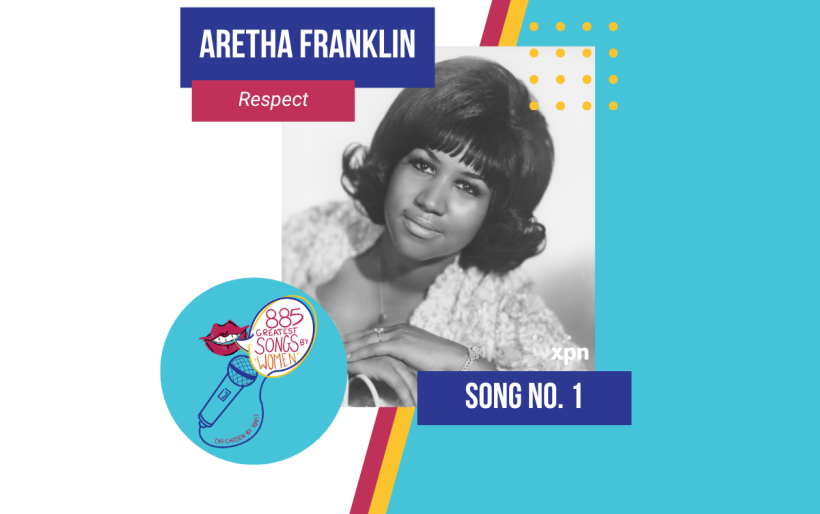Throughout the 885 Greatest Songs By Women (As Chosen By You!) countdown, we’ll take you on deeper dives into select songs that pop up each day.
Out of almost 5,000 voters, WXPN’s listeners felt Aretha Franklin’s “Respect” earned a spot as the top choice on our countdown of the 885 Greatest Songs By Women — and we couldn’t agree more.
What makes “Respect” worthy of such praise is less about the music itself (though, musically, it’s undeniably great) but rather what it did for the generation who saw it breaking down barriers. Aretha was an artist and activist whose lyrical delivery was thought out and changed a nation. WXPN listener, Carmen Daley, saw the same essence in the rendition saying “Aretha changed the song from a sexist trope to a feminist anthem with her voice and one word.” An assertion of deserved respect, Franklin’s version of the song took its earlier version and flipped it on its head, making an iconic piece of music history in the process.
“Respect” had a significantly different message than Otis Redding’s version, written in 1965, who some consider a relic of a misogynistic time. Redding’s version was more of a plea from a man to his wife, framed within the context of traditional gender roles, where the man was the breadwinner and demanded respect upon returning home. David Ritz, author of the biography Respect: The Life of Aretha Franklin, said to The Washington Post: “He [Otis] sings the hell out of it, but Aretha, in her reinvention, personalizes it. Her version is so deep and so filled with angst, determination, tenacity and all these contradictory emotions. That is how it became anthemic.”
Long before she came across the song, Franklin had already been making a name for herself as an activist — going on gospel tours participating in the 1963 Detroit Walk to Freedom with Martin Luther King Jr. and her father, Rev. C. L. Franklin, chairman of the Detroit Council for Human Rights. When she discovered the potential to empower women by redefining the song’s meaning, she brought her own vision to the studio and recorded “Respect” in 1967. She retained much of the original tempo and lyrics but added a bridge and a call-and-response section featuring her sisters, Carolyn and Erma, as backup vocalists. The iconic “sock it to me” phrase emerged organically during the recording, adding a catchy and empowering element to the song.
Aretha Franklin’s rendition of “Respect” became a declaration of a strong, independently wealthy woman who demanded respect from her partner. She changed the lyrics subtly but significantly, shifting the song’s meaning. For instance, she altered the line “you can do me wrong” from Redding’s version to “I won’t do you wrong,” emphasizing the demand for mutual respect and equality. The production and arrangement changes were also notable. Aretha’s version featured a pronounced guitar riff, adding to its distinctiveness. Her delivery of the song emphasized key words and phrases, giving it a commanding and liberating quality. The way she spelled out “respect” and used her powerful vocals turned the song into a rallying cry for women’s empowerment.
“Respect” quickly resonated with both the civil rights and women’s rights movements, becoming an anthem for marginalized groups. Aretha’s rendition transcended its original context, appealing to a broad audience and unifying people across racial and gender lines. This transformation of “Respect” into an anthem of empowerment cemented its place in pop culture. It has appeared in numerous films and was covered by various artists. Its popularity and impact led to Franklin’s 2021 biopic being named after the song, further solidifying its status as an enduring classic.
Aretha Franklin’s rendition of “Respect” remains a powerful and influential song, a testament to her artistry, as well as her ability to use music to promote social change and empower individuals.
